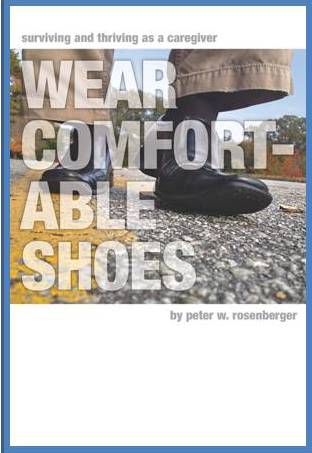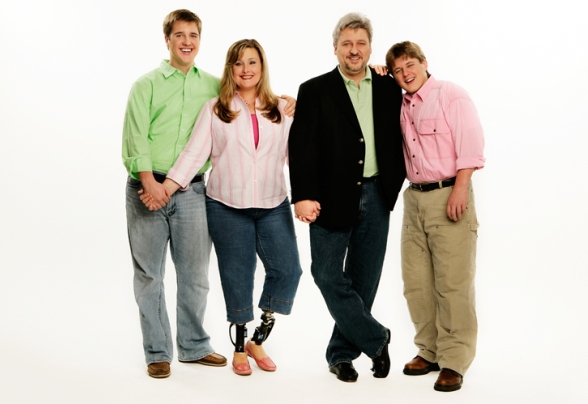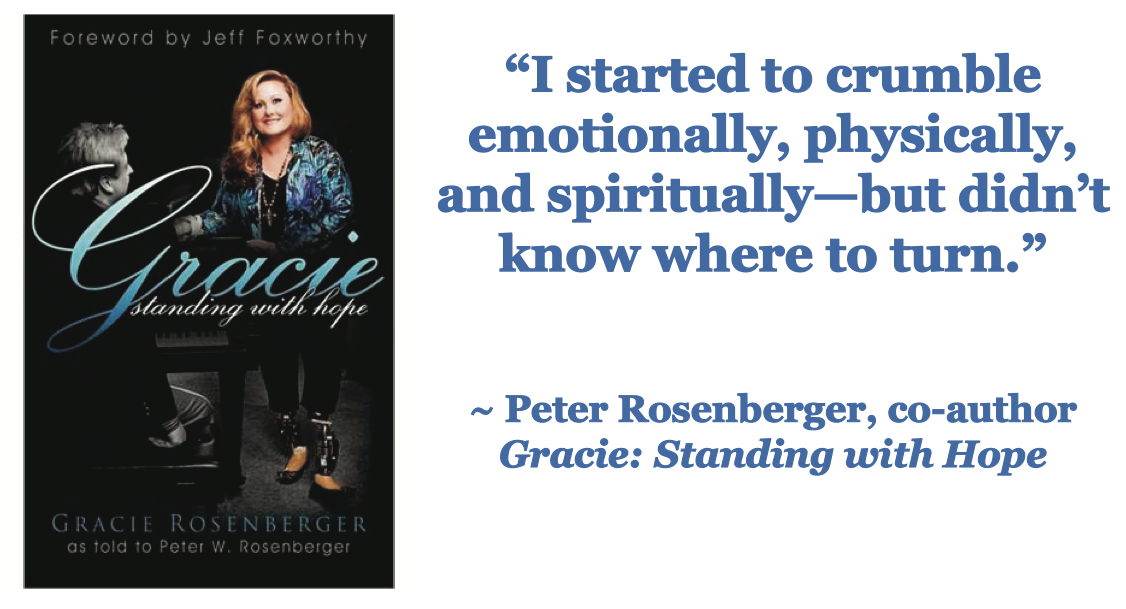 For almost thirty years, author, speaker, and radio host, Peter W. Rosenberger has been the primary caregiver for his wife, Gracie, helping his family navigate what has been a $9,000,000 medical journey, including seventy-eight surgeries, multiple amputations, sixty doctors, twelve hospitals, and seven insurance companies. Because of his experiences, he has earned a theoretical PhD in Caregiving, and in his new book, Wear Comfortable Shoes, he shares much of that hard-earned knowledge—along with encouragement, wit, and a generous dose of faith.
For almost thirty years, author, speaker, and radio host, Peter W. Rosenberger has been the primary caregiver for his wife, Gracie, helping his family navigate what has been a $9,000,000 medical journey, including seventy-eight surgeries, multiple amputations, sixty doctors, twelve hospitals, and seven insurance companies. Because of his experiences, he has earned a theoretical PhD in Caregiving, and in his new book, Wear Comfortable Shoes, he shares much of that hard-earned knowledge—along with encouragement, wit, and a generous dose of faith.
Peter and Gracie, who reside in Nashville, also reach out to amputees in Africa through their organization, Standing with Hope.
Did you always want to write books, host a radio show, and blog to encourage others? What expectations in your life were “interrupted” by Gracie’s devastating detour?
My earliest memories always centered on music. Before I could read, I taught myself notes on the piano. Music remained my first and primary goal for so long—and I set out to study piano and composition. (My degree is Music: Composition and Arranging). Gracie’s accident occurred a couple of years before we even met, so her issues did not detour my music plans per se. From day one, we performed together. Gracie’s voice is a powerful and deeply moving one, and she has touched audiences on some massive stages in her career.
Her health issues seemed to create a “stop-start” type of momentum for us, and the medical bills, surgeries, and other related challenges certainly forced different decision paths. I took jobs that provided health coverage, learned about managing the myriad issues associated with her care, and seemed to drift further away from living as a full-time musician/songwriter.
Along the way, I discovered I wasn’t simply a musician, but rather I am an artist and communicator. Sometimes I use the piano, sometimes I write or arrange songs, sometimes I write books/articles—and sometimes I simply speak in person—or through my radio show. Regardless, I am communicating ideas, passions, thoughts, and feelings to others in a way that I believe connects with them.
Ironically, nearly thirty years after graduating college, I perform musically more now than ever. My church graciously allows me to play for ten to fifteen minutes before each service as individuals enter the sanctuary—as a way of creating a calmer, “more worshipful” atmosphere. The song selection is completely up to me. I choose hymns and songs that are sustaining to me in our journey, and create new arrangements each week. I practice more now than ever before in my life, and find that my playing not only serves the church, but also is a tremendous outlet for me personally to express my heart. It’s a very private moment that I have—which happens to be in a church full of people.
Also, as Gracie stepped into the role of double-amputee in the 90’s, God used that tragic set of events to launch Standing With Hope—our prosthetic limb outreach to amputees in Africa. We train and equip workers there to build and maintain limbs for their own people. With the help of inmates in a Nashville prison, we also recycle used prosthetic limbs. The components on those prostheses are salvaged and used in making new, custom fit limbs for amputees overseas. We do all this to share the Gospel—and equip others to continue standing with hope. (Watch the video here.)
Your blog is all about Divine Detours—I would say that certainly fits the description.
How did the role of “caregiver” impact your life immediately, as well as long term? At what point did you see a positive aspect to your new reality and feel you could learn to manage it?
At first, I threw myself into the task of learning and managing. The former is much easier than the latter. Although I accomplished astonishing things on Gracie’s behalf and have a resume of successes that few do, I quickly discovered it was not enough. Nothing I could do seemed to get me out in front of the issues, and playing “catch up” became exhausting. I started to crumble emotionally, physically, and spiritually—but didn’t know where to turn.
Gracie’s crisis du jour seemed to eclipse everything. At first I thought it was simply relationship issues, and although those did manifest themselves, what I’ve discovered is that the relationship that suffered the most—was with the person I spent the greatest time with: myself. I became so lost in the enmeshment of co-dependency, that I didn’t know how to positively express my own heart in first person singular. I’ve learned that this is a common problem among caregivers—we lose our identity. If we don’t learn how to express our feelings and sense of self in a healthy manner, they will come out in a negative manner . . . which can lead to destructive behavior. You will have to read Gracie’s book to learn how I know this.
It took years, but I slowly, and I mean SLOWLY, learned how to detach myself from the role of “manager” and “fixer,” and shifted to “steward.” Gracie’s issues are beyond my abilities to fix, and it is inappropriate to try. It is a God sized problem—and Gracie has a savior—and I’m not Him. I now seek to do the best I can, and when I’ve reached the end of my abilities, I try to stop. I don’t always get that right, but I am seeking progress not perfection.
 Let’s talk about Wear Comfortable Shoes: Surviving and Thriving as a Caregiver, which is the follow-up to Gracie: Standing with Hope. Please tell us about the new book. Who should read it?
Let’s talk about Wear Comfortable Shoes: Surviving and Thriving as a Caregiver, which is the follow-up to Gracie: Standing with Hope. Please tell us about the new book. Who should read it?
Wear Comfortable Shoes is not really a follow up to Gracie’s book but rather a simply written set of life-lessons I’ve learned while staring at this mountain for so many years. Grace—Standing With Hope is a biographical story of Gracie’s and our family’s life—and a powerful one. Wear Comfortable Shoes, however, is me sitting at the kitchen table with a fellow caregiver and sharing practical things over a cup of coffee. People living with this type of stress aren’t looking for the next great American novel about this subject—nor do they want a textbook or a “how-to manual” on dealing with their circumstances. My book is, “Here’s something you can do today that costs little or no money—and will immediately calm your heart and help you think a bit clearer about the issues.”
As important as insurance matters continue to be, I never forget that most caregivers struggle with assurance issues, as well. In Wear Comfortable Shoes, I try to speak to the heart of the terribly frightened caregiver who feels as if they are drowning. The strain of caring for a chronically ill/disabled loved one is intense, and I want to offer the hand of experience to those hearts that are faltering—and let them know that they are not alone. The isolation they feel is real, but can be overcome—and they can have community and fellowship while dealing (with) these issues.
A friend recently sent me an email sharing that she attended a women’s retreat in her town—and saw an elderly woman sitting by herself during the lunch break. Sitting down with her, my friend introduced herself and asked about the woman.
“I wasn’t going to come to this conference, because it’s too hard to get away from my husband who has Alzheimer’s disease,” the woman stated. “But I’ve been reading this book titled, Wear Comfortable Shoes, and the author really made a case for how I should do things like this to take care of myself.”
Stories like that of how my book has practically helped a hurting heart are deeply meaningful to me.
What is the one most important piece of advice you would offer to those who have been thrown into a caregiver role?
Other than the advice given in the title of the book, I share the simplest message I know with folks, one that I learned while flying Delta Airlines to Atlanta one day, I discovered that flight attendants state the best advice for caregivers–all day long:
In the unlikely event of the loss of cabin pressure, oxygen masks will drop from the ceiling. Securely place your mask on first, before helping anyone next to you who may need assistance.
That small directive, what I call “The Delta Doctrine,” contains applicable wisdom for so many life circumstances–but probably none as poignant as for those of us serving as a caregiver for a chronically ill/disabled loved one.
Compassion and love often mistakenly lead us to hold our own breath–while trying to help someone else breathe, but once we make that decision, it is only a matter of time before we find ourselves gasping for air. If we are unable to breathe, how can we help anyone else?
Yet, many of Americas’ sixty-five million caregivers desperately try to assist a vulnerable loved one–while growing dangerously close to “blacking out” themselves. Grabbing the mask first is not a sign of selfishness, but rather the whisper of wisdom. Unfortunately, that soft voice is hard to hear over the often-deafening cries of someone we love.

Those who “push the wheelchair” serve as the critical team player for a suffering patient. Sadly, few know how to create a sustainable care structure for themselves. Simply getting sleep and eating a good diet is not enough. Caregivers must remain healthy physically, financially, emotionally, professionally, and spiritually–but that is impossible to do without reaching for the mask first. Wear Comfortable Shoes helps others know what putting the mask on for themselves looks like.
How does your faith play into your work?
My faith continues to grow and serve as the anchor for all of this. I don’t know how non-believers do something like this. This world is crushing, and I don’t have it in me to withstand this on my own. What Christ did on the Cross—and then rising from the dead, trumps all of this. Those two events place all of this in perspective. There is nothing more relevant to the sufferings of this world than the redemption work of God through Christ. Charite Bancroft stated it much better in this verse from Before the Throne of God Above.
When Satan tempts me to despair
And tells me of the guilt within,
Upward I look and see Him there
Who made an end of all my sin.
Because the sinless Savior died
My sinful soul is counted free.
For God the just is satisfied
To look on Him and pardon me.
Reading those words strengthens my heart and equips me to continue standing with hope—knowing that my rescue from a greater calamity than this present state is secure in the redemptive work of Christ.
A few fun questions…
What is your favorite comfort food and why?
I like homemade vegetable beef soup and homemade peach cobbler. The soup reminds me of simple meals around the table with my family. I love the cobbler because it reminds me of covered-dish suppers at the country church where I was raised. One lady in particular, Sara Lee Drake, made the most amazing cobblers, and every time I have such a cobbler, it immediately takes me back almost forty years—to lazy summer days growing up in South Carolina.
This website features musicians as well as writers. Please tell us about your and Gracie’s musical performances for former presidents.
Gracie and I have had the privilege of performing for both George W. Bush, and his father, George H. W. Bush. In addition, we performed at the Republican National Convention in New York (2004). Gracie was the first woman with a disability to perform at any political convention. We’ve had so many performances in our life, but I think our times at Walter Reed Army Medical Center were the most memorable. Watching Gracie sing for her fellow amputees stands out as such a meaningful and powerful moment. Now with our son serving (he is a cadet at the United States Military Academy at West Point), it makes those times even more special in our hearts. *You can see more on the video link.
In the story that is your life, are you the tall, dark stranger; the romantic lead; the mythical warrior; the mad scientist; or the child in an adult’s body?
It’s more of romantic comedy with many hospital visits (and a few mad scientist moments). Combine Mr. Mom with M*A*S*H—and throw in a little Forest Gump.
I’m a dog lover. Please tell us about your pets, if any, or your favorite pet as a child.
We have an Australian Shepherd named McAllister (MACK). He is somewhat hyperactive—but a wonderful dog. The squirrels and chipmunks that seem to ignore his frantic barking through the windows and door—daily torment him. Their scampering about nearly drives him mad. No intruder will ever get close to our doors, and he is the smartest dog I have ever owned. The groomers at Pet Smart just adore him, and always give him a wonderful report card. He’s loving—and he brings great joy and comfort to Gracie. After a lengthy stay in the hospital recently, he was nearly doing flips as I wheeled her into the house.
Thank you, Peter! It’s a great pleasure to have you as a guest at DivineDetour. May God continue to bless you and Gracie as you bless others.
~ ~ ~
For more information about Peter and Gracie, visit their website. To learn more about Standing with Hope, including how to help, visit here.
To purchase Wear Comfortable Shoes: Surviving and Thriving as a Caregiver and/or Gracie: Standing with Hope, logon to:



Kathy thank you so much for this post. It has given me a new resource to use with my hospice families and caregivers – and two new blogs to follow! 🙂 Have a great weekend.
Thanks, Sherri! I pray that God will bless your work as you reach out to others.